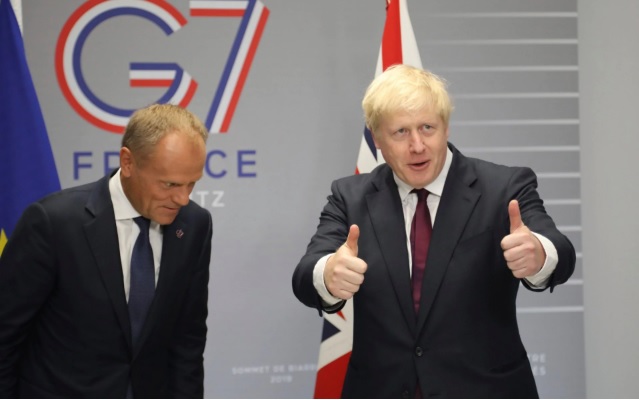Being sensible failed to get a good Brexit deal. We need a little madness
The Times
July 10 2019
In 1980 Margaret Thatcher declared to the EEC (the forerunner of the EU) “I want my money back” and threatened to withhold payments or even leave the trading bloc altogether.
A BBC camera crew crouching low behind a hedge in the gardens of the Palace of Versailles while they changed a film magazine out of the direct glare of the sun, managed to record a private conversation between President Francois Mitterrand of France and Germany’s Chancellor Helmut Kohl. Mitterrand asked Kohl whether they should concede the rebate and Kohl replied that he thought Thatcher was unpredictable and mad enough to leave the EEC if they didn’t pay up so they had better agree.
In 2018, that rebate accounted for £4.2billion.
President Mitterrand later described Margaret Thatcher as having the eyes of Caligula but the mouth of Marilyn Monroe”. “Madness” is a quality that impresses the EU. It’s an asset. Not a liability.
So should we be surprised that the sane approach adopted by Theresa May inevitably failed to impress? That our civil servants working rationally with their civil servants resulted in a Withdrawal Agreement that few could support?
By contrast, Martin Selmayr, the newly appointed Secretary General of the EU Commission describes a Boris Johnson administration in the UK as “a horror story”. Meanwhile Elmar Brok, senior MEP for Merkel’s CDU party says of Boris: “It’s fun to talk to him – it’s really fun to talk to him, intellectual fun. But to run a country?” And Guy Verhofstadt, the EU’s Parliamentary Brexit negotiator, described Boris Johnson as “a man who continues to dissemble, exaggerate, and disinform the public” a perpetrator of “false promises, pseudo-patriotism, and foreigner bashing”. They think Boris is both unpredictable and maybe a little mad.
On the other hand, very little is said of Jeremy Hunt despite his being Foreign Secretary and a contender for the leadership of our nation.
Some months’ back, Jean Claude Juncker claimed that the European Union is a “rules based” and rational organisation. That has never been the case. France is able to break the European Central Bank’s borrowing regulations while Spain, Portugal, and Greece never met the criteria to join the Euro in the first place.
A lack of logic and a willingness to bend the rules is a characteristic of the European Union. No wonder, then, their fear of negotiating with someone who is similarly disposed to negotiate irrationally and unpredictably.
Although it is argued by some that Jeremy Hunt is a more strategic thinker than Boris, perhaps in these times what we need is a little madness. Or at least the perception of madness by others. Hunt suffers from being a decent person in indecent times.
Meanwhile Boris will be all too aware that if he reneges on his pledge to take us out of the EU by October 31st, it could spell the end of the Conservative Party, or at the very least the end of his own government.
The meteoric rise of the Brexit Party has demonstrated that old party loyalties are no longer as strong as they once were. For many traditionally Conservative voters, Brexit now takes precedence above all else.
The damage already inflicted on the Conservatives by the Brexit Party is still reversible; but both Boris and the EU understand that this is his last chance.
David Cameron and Theresa May took pride on their pragmatism, yet in both cases it was that very pragmatism which led to their downfall.
In Cameron’s case, he repeatedly stated during the EU renegotiation process that he would “rule nothing out” and might back Leave if Britain’s demands were not met. They were not. Yet he then campaigned for Remain anyway despite his not achieving most of his objectives.
Three years later, May made the same mistake. Despite her infamous “No deal is better than a bad deal” mantra, she wound up embracing a bad deal, even after multiple defeats in Parliament.
I suspect Boris will prove to be a very different beast. Whether you agree with him or not that apocalyptic predictions of a No Deal Brexit are “wildly overdone”, there can be little doubt that he would be seen by the Europeans as ‘mad enough’ to go through with it.
We are reaching the final stages of a high stakes game of chicken, and the EU might be about to blink first.
But if it does not, and if, as threatened, the House of Commons brings down the Government and we face a Halloween general election, it will need a little madness and a lot of pizazz for the Conservatives to overcome the twin threat of the Brexit Party and Jeremy Corbyn.
Michael Fabricant is a Conservative MP. @Mike_Fabricant

